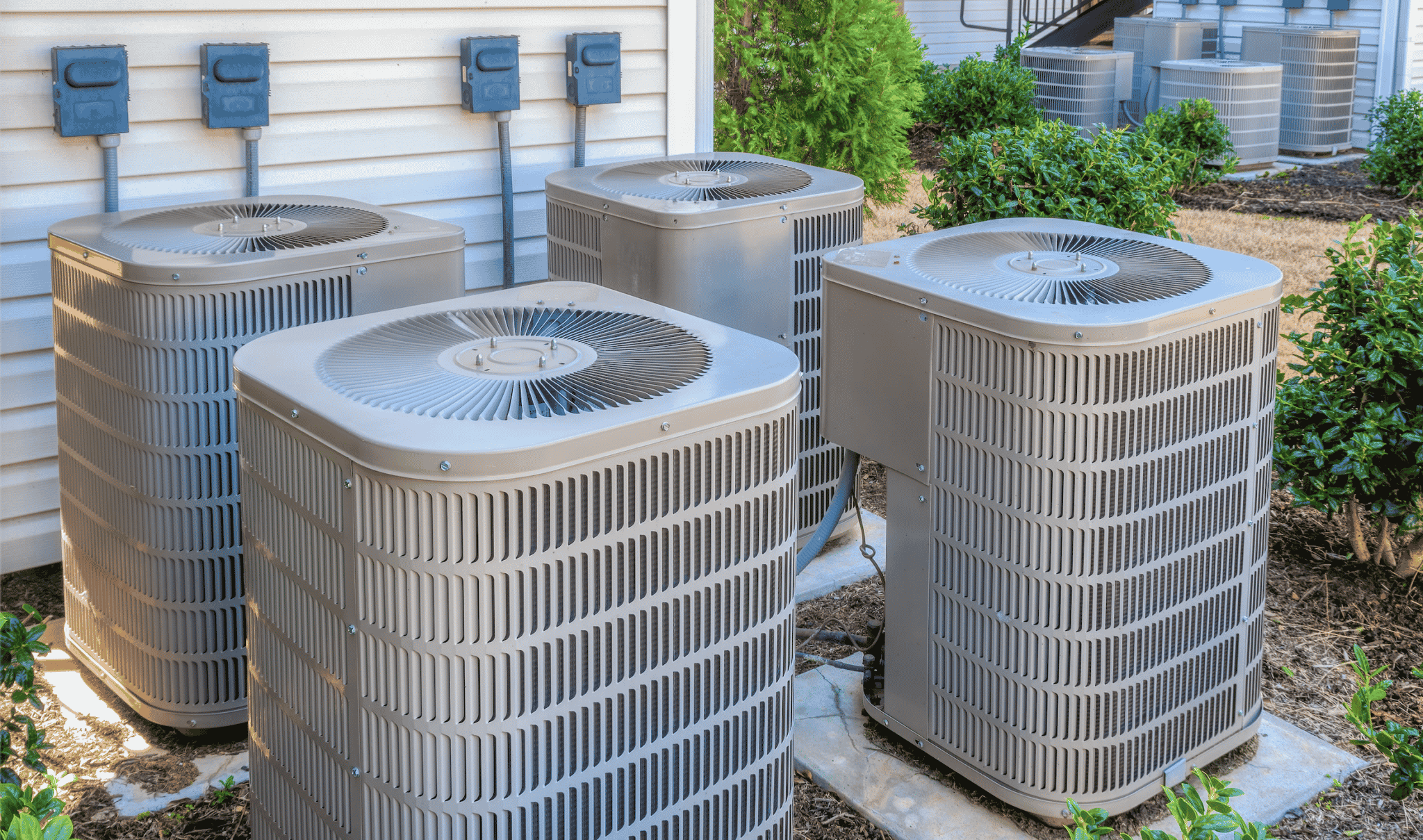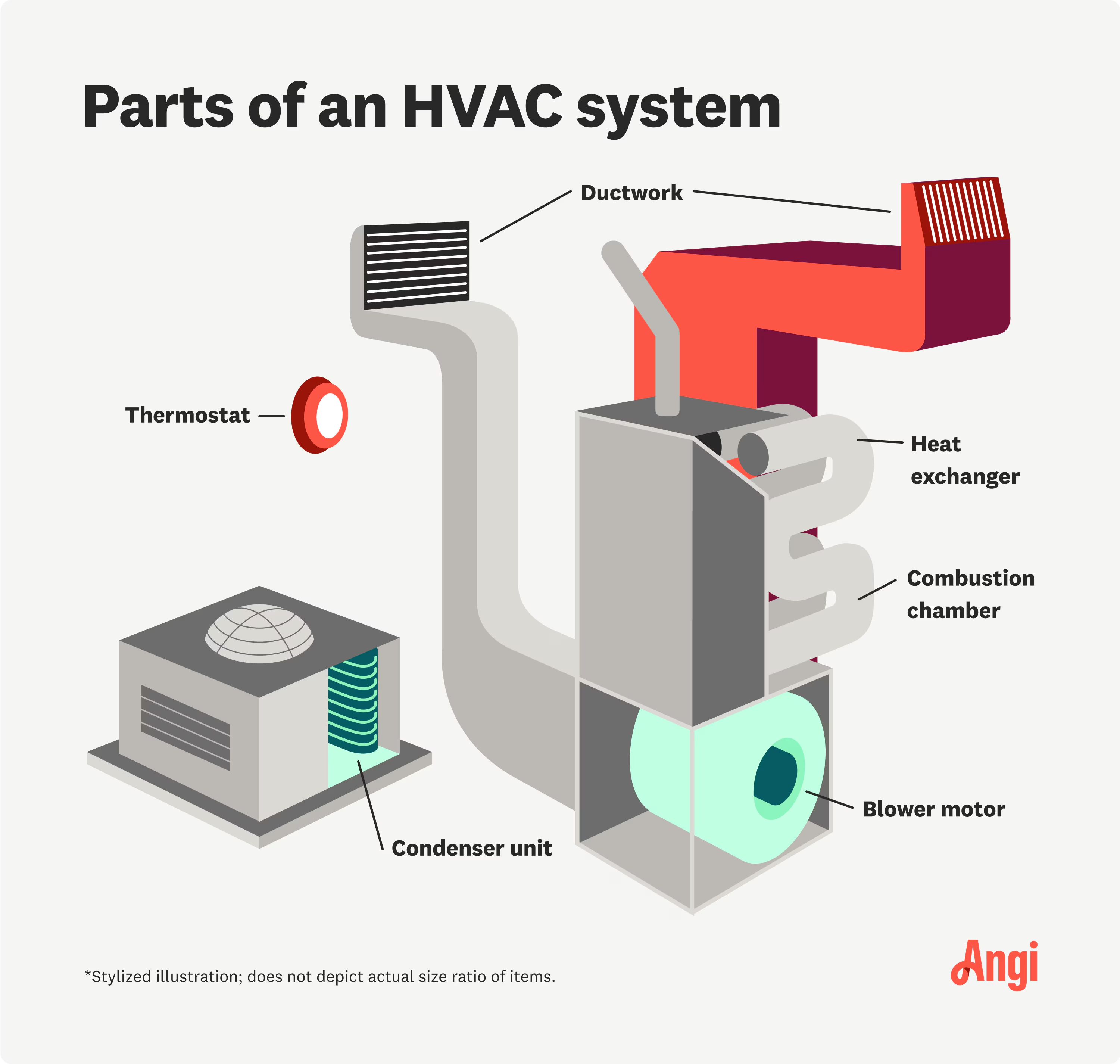Find out how HVAC experts maximize longevity of your home system
Exploring the Necessary Components of a Reliable Cooling And Heating System
A reliable a/c system is built on several critical components that operate in harmony. Each part, from the thermostat to the ductwork, plays a vital role in keeping convenience and energy performance. Understanding these aspects is essential for maximizing performance and boosting interior air quality. As one analyzes these parts, the detailed partnerships between them expose understandings into improving total system effectiveness. What certain variables contribute most to this performance?
The Function of the Thermostat in HVAC Efficiency

Usually ignored, the thermostat plays a vital function in the performance of A/c systems. This little device functions as the key nerve center, managing temperature level setups and making sure suitable convenience within a room. By accurately picking up the ambient temperature level, the thermostat communicates with the ventilation, air, and heating conditioning systems to keep the desired climate
An effective thermostat lessens energy usage by triggering the a/c system just when required, therefore protecting against excessive home heating or air conditioning. Modern programmable and wise thermostats enhance this performance additionally by permitting customers to set timetables and remotely readjust settings, adapting to everyday routines.
The placement of the thermostat is crucial; improper place can lead to unreliable temperature analyses, resulting in ineffective procedure. Overall, a well-functioning thermostat not only improves comfort yet additionally adds significantly to power cost savings and the long life of the a/c system.
Understanding the Value of Air Filters
Air filters offer a crucial function in cooling and heating systems by guaranteeing that the air distributing within an area stays tidy and healthy and balanced. These filters catch dirt, allergens, and various other pollutants, preventing them from being recirculated throughout the setting. By recording these particles, air filters add to improved interior air high quality, which can considerably benefit owners' health and wellness, particularly those with allergic reactions or respiratory problems.
Furthermore, maintaining clean air filters enhances the performance of a/c systems. Clogged filters can limit airflow, causing the system to work harder to keep desired temperature levels, causing boosted energy intake and higher utility costs. Frequently replacing or cleaning filters is a vital maintenance action that can lengthen the life-span of cooling and heating devices. Eventually, comprehending the significance of air filters permits house owners and structure supervisors to take positive procedures to ensure a well-functioning, effective heating and cooling system that advertises a risk-free and comfy indoor atmosphere.

The Functionality of the Heating System and Heat Pump
Heaters and heatpump are crucial components of HVAC systems, liable for giving warmth throughout chillier months. Furnaces run by heating air via burning or electric resistance, after that dispersing it throughout the home by means of ducts. They normally offer fast home heating and can be fueled by gas, electrical energy, or oil, depending upon the system type.
On the other hand, warm pumps move warmth as opposed to produce it. They remove warm from the outside air or ground, even in reduced temperatures, and transfer it inside your home. HVAC experts. This twin capability enables heatpump to likewise provide cooling in warmer months, making them flexible options for year-round environment control
Both systems call for appropriate upkeep to ensure performance and longevity. While heating systems stand out in severe chilly, heat pumps can be useful in moderate environments. Understanding their distinctive capabilities aids homeowners in picking one of the most suitable option for their heating requires.
Exploring the Air Conditioning System
The air conditioning unit is an essential part of heating and cooling systems, offered in different kinds to match different demands. Comprehending the effectiveness scores of these units is crucial for making informed selections concerning energy consumption and expense. This area will certainly discover the varied sorts of ac unit and clear up exactly how effectiveness rankings influence efficiency.
Kinds Of Air Conditioners
While different elements affect the choice of a/c systems, understanding the various types readily available is anchor crucial for property owners and structure supervisors alike. Central air conditioners are made to cool down entire homes or structures, making use of a network of air ducts for air movement. Window units offer an even more localized option, ideal for little rooms or solitary spaces. Portable a/c unit give flexibility, permitting users to relocate the unit as required. Ductless mini-split systems are an additional choice, integrating the effectiveness of main systems with the ease of zoning, as they need no ductwork. Geothermal systems harness the earth's temperature for energy-efficient cooling. Each type comes with unique benefits, making informed selections essential for effective environment control.

Efficiency Ratings Explained
Recognizing effectiveness scores is necessary for choosing the best air conditioning system, as these metrics offer understanding into the system's efficiency and power intake. One of the most common rating for ac unit is the Seasonal Power Effectiveness Proportion (SEER), which measures the cooling result throughout a regular cooling season divided by the complete electric energy input. A higher SEER indicates far better performance. Furthermore, the Power Efficiency Proportion (EER) is used for gauging effectiveness under particular conditions. Another crucial metric is the Power Star certification, which signifies that a device satisfies rigorous energy effectiveness standards. By evaluating these rankings, customers can make informed options that not just optimize comfort but additionally decrease energy prices and environmental impact.
The Value of Ductwork and Air flow
Efficient ductwork layout and air movement monitoring play critical duties in the overall efficiency and efficiency of HVAC systems. Appropriate ductwork assurances that conditioned air is dispersed evenly throughout a room, reducing temperature fluctuations and boosting convenience. Well-designed air ducts reduce resistance to airflow, reducing the work on a/c tools and inevitably lowering energy consumption.
Air flow monitoring involves strategically placing vents and registers to improve the flow of air. This prevents typical problems such as warm or cool areas, which can take place when air movement is blocked or improperly balanced. Furthermore, the best duct materials and insulation can additionally boost effectiveness by lowering heat loss or gain during air transit.
A reliable ductwork system not only adds to energy cost savings yet can also extend the life expectancy of cooling and heating devices by lowering unneeded stress (HVAC experts). As a result, understanding the importance of ductwork and airflow is vital for attaining peak heating and cooling system performance
Routine Maintenance Practices to Enhance Performance
Routine upkeep methods are essential for making sure peak performance of cooling and heating systems. These methods include regular examinations, cleaning, and necessary repair services to keep the system running effectively. Regularly changing air filters is important, as clogged filters can block air movement and minimize effectiveness. In enhancement, technicians must inspect and tidy evaporator and condenser this coils to stop overheating and power waste.
Annual professional assessments are also advised, as trained specialists can identify possible issues prior to they intensify. Lubricating moving components reduces damage, adding to a longer life-span for the system. Furthermore, making certain that the thermostat functions appropriately help in keeping perfect temperature control.

Regularly Asked Inquiries
Exactly how Commonly Should I Change My Thermostat?
Thermostats should commonly be changed every 5 to 10 years, relying on usage and technology advancements. Regular checks are suggested to guarantee peak efficiency, especially if experiencing inconsistent temperature level control or raised energy costs.
What Dimension Air Filter Is Best for My Cooling And Heating System?
The very best dimension air filter for a heating and cooling system varies check by device style. Typically, it's essential to consult the proprietor's guidebook or inspect the existing filter dimensions to ensure peak efficiency and air high quality.
Can I Install a Heatpump Myself?
Setting up a warm pump independently is feasible for experienced individuals, however it requires understanding of electrical systems and regional codes. Working with an expert is recommended to assure proper setup and ideal system efficiency.
Exactly how Do I Know if My Ductwork Is Effective?
To identify ductwork effectiveness, one need to examine for leaks, procedure air movement at vents, check insulation high quality, and assess temperature differences in between supply and return ducts. Expert analyses can offer thorough understandings into total efficiency.
What Are Signs My Cooling And Heating Requirements Immediate Maintenance?
Signs that a HVAC system needs prompt upkeep consist of unusual sounds, inconsistent temperature levels, increased energy bills, unpleasant odors, and constant cycling. Resolving these issues without delay can avoid further damage and assurance optimal system efficiency.
Air filters offer an essential function in Cooling and heating systems by assuring that the air flowing within an area stays healthy and balanced and tidy. Additionally, preserving tidy air filters boosts the performance of HVAC systems. Ductless mini-split systems are an additional choice, integrating the performance of main systems with the benefit of zoning, as they call for no ductwork. Understanding efficiency ratings is essential for choosing the best air conditioning device, as these metrics provide insight into the system's performance and power intake. The best dimension air filter for a Cooling and heating system varies by system design.